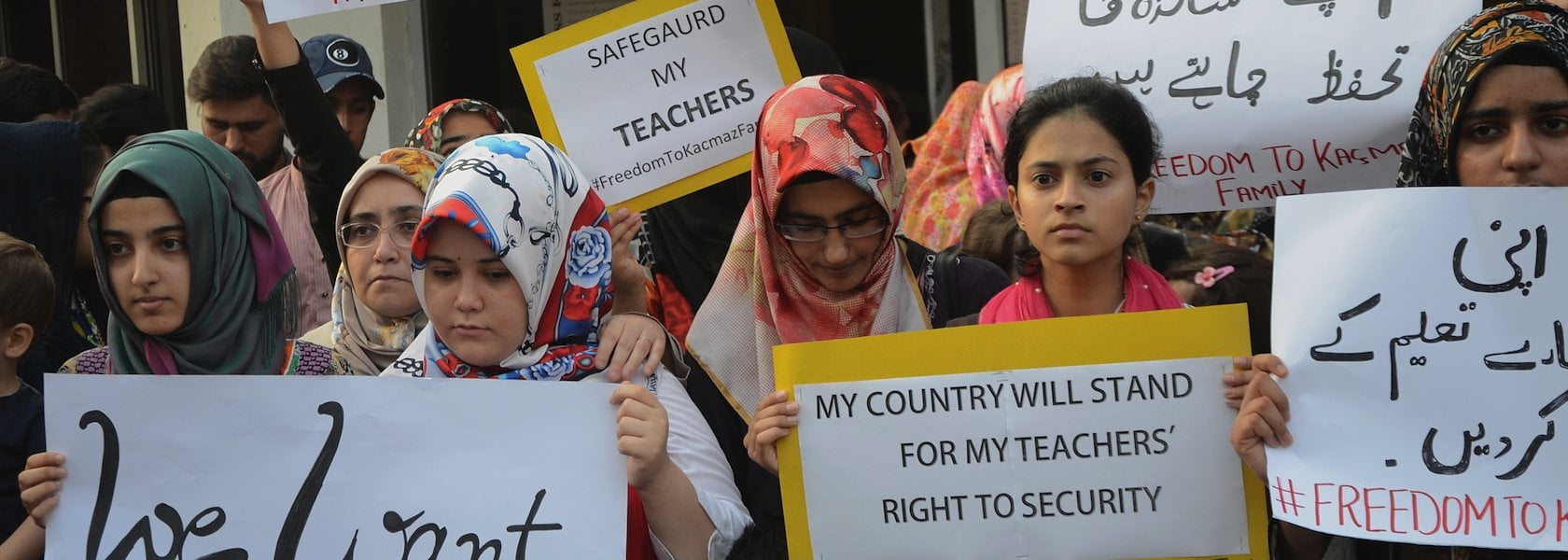285 Turkish teachers and families risk forcible deportation and persecution in Pakistan

Date posted: October 26, 2017
(Lahore, Paris) Pakistan must protect 285 Turkish nationals from forcible repatriation, arbitrary arrest, and other human rights abuses, FIDH (The Worldwide Human Rights Movement) and its member organization Human Rights Commission of Pakistan (HRCP) said today. This call follows the deportation of a Turkish family of four on 14 October 2017.
“The Pakistani government’s deportation of a Turkish family should set off alarm bells. The Pakistani government must ensure the protection of the other 285 individuals who risk being deported to Turkey and put an end to the blatant disregard of its international obligations.”
The 285 Turkish nationals, who are teachers associated with the Pak-Turk schools and their families, have been facing deportation to Turkey since November 2016. The 285 now live in fear of raids carried out by the Pakistani police and intelligence services in Pakistan. Should they be deported to Turkey, they are at high risk of arbitrary arrest, judicial harassment and detention upon arrival. Such detention may be accompanied by torture and other forms of ill-treatment. This occurs in the context of the Turkish government’s crackdown on teachers, journalists, academics, and human rights defenders in the aftermath of the July 2016 failed coup d’état in Turkey. Turkey has already succeeded in obtaining the forcible repatriation of teachers linked to the Pak-Turk schools from Malaysia, Myanmar, and Saudi Arabia.
On 27 September 2017, the former head of the Pak-Turk schools in Pakistan, Mr Mesut Kacmaz, was abducted along with his wife and their two children. On 14 October 2017, the Kacmaz family was handed over to Turkish policemen and forcibly repatriated to Turkey in a plane sent by the Turkish government. Since their arrival in Turkey, they have been under police custody. This forcible repatriation occurred despite statements made by Pakistan’s Foreign Affairs Minister Khawaja Asif during a visit to the US in early October 2017 that the Turkish teachers and their families would only be deported once delays granted by the Pakistani courts and protection afforded by the United Nations High Commissioner for Refugees (UNHCR) had expired.
The Pakistani government’s initial deportation order for the Turkish teachers to leave Pakistan by 20 November 2016 has been suspended by several Pakistani high courts. Further, ‘Asylum Seeker Certificates’ granted by the UNHCR specifically state that the Turkish nationals should be protected from forcible return to a country where they claim they could face threats to their life or freedom. While these certificates have now been extended until 11 October 2018, dozens face broader challenges concerning their status: 85 people have new-born children without passports; others have passports that have expired; and members of one family have been stripped of Turkish citizenship.
The forcible repatriation of the Kacmaz family and the risk of deportation faced by the remaining 285 Turkish nationals are in violation of Pakistan’s obligations under international law. In particular, they are in breach of Article 3 of the Convention against Torture and Other Cruel, Inhuman or Degrading Treatment or Punishment, which stipulates that “[n]o State Party shall expel, return (“refouler“) or extradite a person to another State where there are substantial grounds for believing that he would be in danger of being subjected to torture.” The abduction of Mr Kacmaz’s two daughters is also in breach of Pakistan’s obligations under Articles 22 and 37 of the Convention on the Rights of the Child, to which Pakistan is a state party. [1]
“By forcibly repatriating the Turkish family, Pakistan flouted its international obligations simply to appease the Turkish government. It must reverse this approach with respect to the 285 Turkish nationals who still face deportation and ensure that it puts their human rights first.”
FIDH and HRCP condemn in the strongest terms the deportation of the Kacmaz family to Turkey and call on the Pakistani authorities to respect the rights of the 285 Turkish nationals remaining in Pakistan – in particular their right to non-refoulement – in accordance with international law. The two organizations also call on the Pakistani authorities to respect the asylum seeker status granted by the UNHCR until October 2018, and to uphold orders by the domestic courts.
Press contacts
Mr. Andrea Giorgetta (English) – Tel: +66 886117722 (Bangkok)
Ms. Audrey Couprie (French, English) – Tel: +33648059157 (Paris)
Footnotes
[1] Article 22 provides that “States Parties shall take appropriate measures to ensure that a child who is seeking refugee status or who is considered a refugee in accordance with applicable international or domestic law and procedures shall, whether unaccompanied or accompanied by his or her parents or by any other person, receive appropriate protection and humanitarian assistance in the enjoyment of applicable rights set forth in the present Convention and in other international human rights or humanitarian instruments to which the said States are Parties”; Article 37(b) provides that States Parties shall ensure that “[n]o child shall be deprived of his or her liberty unlawfully or arbitrarily. The arrest, detention or imprisonment of a child shall be in conformity with the law and shall be used only as a measure of last resort and for the shortest appropriate period of time”.
Source: The Worldwide Human Rights Movement , October 26, 2017
Tags: Education | Hizmet-inspired schools | Pakistan | Persecution of Hizmet by Erdogan |
























